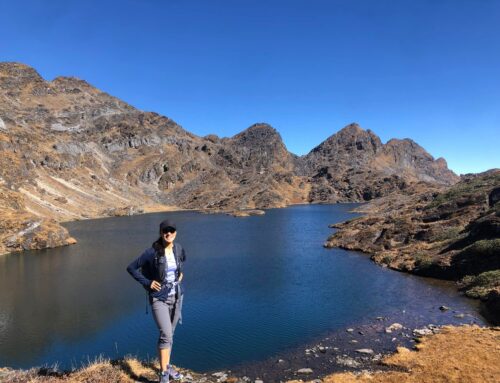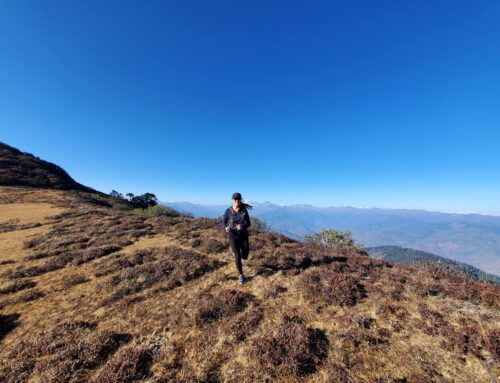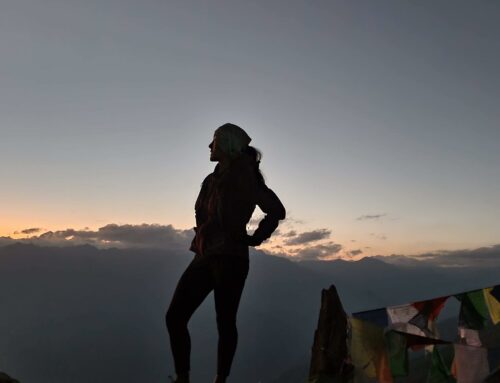Day 14
The next three days of Advent fill out a travelogue of my trip to India exactly one year ago.
I spent Christmas a year ago in Bhutan, with my partner's family and on a project with a management institute for which I organized a workshop. Before arriving in Bhutan, we had planned a few days in Assam, in northeast India.
I read on a travel blog that in Assam, in northeastern India, you could experience the "Big Five" of India on safari tours. My friend and I also wanted to explore the craft of raw silk production - the cooperative in his home village in eastern Bhutan, not far from the border with Assam, sources the yarn for its textiles, which they color with organic colors and turn them into robust, beautiful weave fabrics. We just wanted to have a few days to ourselves, because in our long-distance relationship we had only seen each other 2-3 times a year.
We had arranged to meet on December 9th in Guwahati, the capital of Assam, from where we wanted to go on a guided tour. For me it was the 4th time that I would travel to Bhutan via Assam. All previous trips in 2014, 2016 and 2018 were safe and enabled me to immerse myself in the culture of India - and to enjoy nature along the Brahmaputra and around the tea plantations with a view of the steeply rising Himalayan slopes of Bhutan. It is a 2-3 hour drive from Guwahati to the border. It is advisable not to drive yourself, but to book drivers and vehicles for the journey through travel agencies.
When we all had no idea what 2020 would bring, I instead made my first experience of locking myself in a hotel room in isolation during a lockdown and an incalculable danger situation in a strange city. It was my first time learning what the English terms "lockdown" and "curfew" mean. I found myself in a dangerous situation, most of the time the danger was not visible to me. I experienced people who fueled hatred and exclusion - but I also had the wonderful experience of solidarity, charity and joie de vivre.
I landed in Delhi at 1:00 am - but this time it took much longer to get through the immigration check counters - that might have puzzled me already, I just noticed. In any case, at 2:30 in the morning I fell dead tired into my hotel bed and hadn't switched on my cell phone after landing and had no internet reception neither. Is everything a bit more complicated in India and because I had to be back at the airport the next morning anyway - 3 hours before my flight to Guwahati - I decided that I would rather get a little sleep instead of being annoyed in trying to establish a telephone or internet connection. But whether I listened to the bad news 3 hours earlier that my friend had already left me there - nothing could have prevented of what came my way.
Anyway, I didn't turn on my phone until just after 7:00 in the morning after I checked in and got myself a lousy breakfast somewhere in Delhi airport. Tshering had left me several messages the day before and during the night that I should call him immediately - and at first I didn't understand what he had to say to me: he had not yet made his way to Guwahati and was still there at the border in Bhutan, in Samdrup Jongkhar. At first that was not worrying - it would be another 6 hours before I landed - and he had booked a driver to take him to the airport in time for my arrival. But Tshering said that everything was different now, because political unrest had broken out in Assam and especially in Guwahati. Since there are often armed turmoils with Indian independence fighters, especially in Assam and on the southern border of Bhutan, Bhutan immediately closed the border with India. Nobody came in - and Tshering didn't come out. The political demonstrations in Guwahati this time were not initiated by a chaotic rebel junta from the jungle, but by students and intellectuals - as in numerous other cities in India that same week, especially in Delhi and Mumbai. The trigger was a very controversial legislative decision by the national government on the eve of my departure in Germany. Neither Tshering nor myself had any background information yet and it was not easy to get an idea in the few hours at the airport in Delhi. The fact was: there was no alternative for me as to fly to Guwahati, because my entry papers for Bhutan stipulated that I had to be at the border gate in Samdrup Jongkhar on December 13th - not before, not after and certainly not at another border post. I couldn't easily change my plans and fly from Delhi to Paro just like that. It was also clear that I had no place to stay in Guwahati. I was also not allowed to drive from Guwahati to the Bhutanese border because there was a curfew in all of Assam. I was still surfing for hotels at the airport in Delhi - preferably in one of the city's international hotel chains - and I had already found a few hotels, but not yet booked them. I was of the opinion that I first had to know the location on site - and then still be able to book something over the Internet.
The first thing I noticed after landing in Guwahati: the entire airport hall was already clogged with stranded travelers who were prepared not to be able to leave the airport that day. The second thing I noticed was that there was no internet connection - the government had shut it down.
There was a sign in the airport reception hall pointing to a hotel booking desk outside the hall. I never found this desk - instead, as one of the few western tourists easily recognizable that day in this remote city of India, I was approached by two military police officers with machine guns ... how it went on, more to come tomorrow ...




